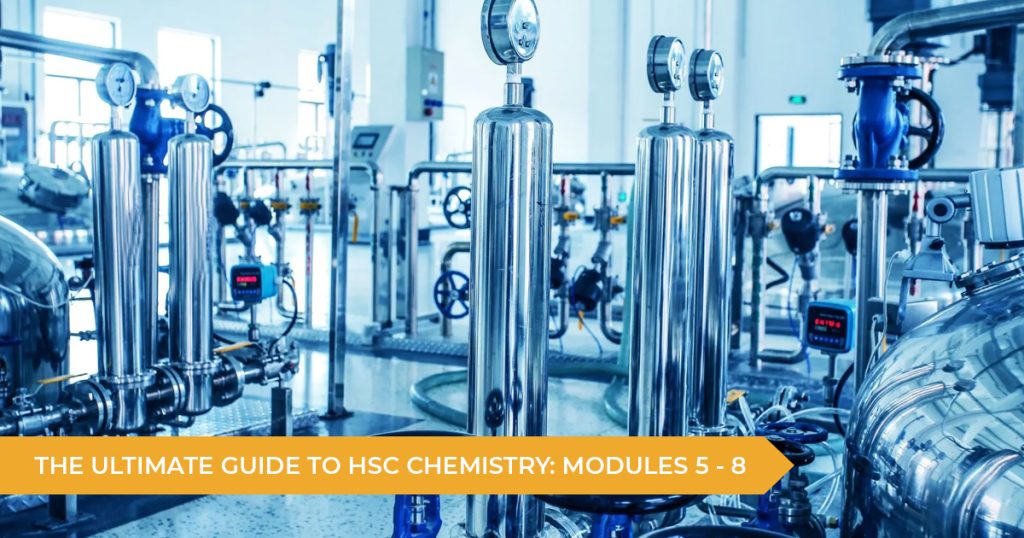Master each module which forms HSC Chemistry

The HSC Chemistry course is broken down into four modules. Each module focuses on a core element of all fields of chemistry that you could study later on at University.
In this entry, I’d like to discuss each module briefly and give you an idea of what types of questions you’ll likely face in exams.
Module 5: Equilibrium and Acid Reactions
My name for this module: Equilibrium Reactions
Basically, ignore the fact that the module title mentions acids, as that comes later in Module 6.
This module is primarily concerned with reactions that are reversible; otherwise known as equilibrium reactions. Several specific reactions are mentioned in the syllabus so be careful to prepare for those (iron(III) thiocyanate and cobalt(II) chloride hydrate for example).
The three main concepts you’ll need to understand here are:
– Le Chatelier’s principle: This allows you to predict what will happen to an equilibrium if you change the temperature, pressure, concentration, volume, etc in a reactor. Sometimes, exams will ask you to try and graph these changes on concentration vs. time graphs.
– Equilibrium constants: Allows you to quantify changes in an equilibrium.
– Solubility Products: Applying the idea of an equilibrium constant to specifically the dissolution of salts in water.
RELATED: How To Master HSC Chemistry Before Exams Start
Module 6: Acid/Base Reactions
My name for this module: Acid/Base Calculations
Aside from some initial naming and equation writing for acids and bases, the module is purely about analysing acid/bases reactions quantitatively, so it has the most calculations out for the four modules.
It also tends to involve the most practical work, which can all be tested in various ways. This includes writing experimental methods and risk assessments, while also being able to interpret given results.
The main three concepts you’ll need to understand are:
– Bronsted-Lowry theory: acids donate protons and bases accept protons in aqueous solutions.
– Distinguish between calculate pH, pOH and pKa and apply them to many calculation questions.
– Titration: a practical technique used to determine the concentration of an unknown substance.
Module 7: Organic Chemistry
My name for this module: Carbon Chemistry
This module probably contains the most raw content for students to memorise and recall during an exam, but it also follows lots of well-defined rules. The first section is purely concerned with how to name all the various carbon-based compounds we look at for the HSC (alcohols, amines, carboxylic acids and polymers to name a few), which may first seem like a lot to remember, but actually follows a very strict system based on the carbon chain length. After that, it’s primarily concerned with predicting the properties, uses and potential reactions for all of these different classes of compounds.
The main three questions you’ll want to answer YES to before your HSC would be:
Do you understand the IUPAC system for naming carbon compounds?
Can you predict the products given two starting reactants?
Could you look at a chemical structure and predict some of its physical and chemical properties?
RELATED: Helena’s Tips For Conquering HSC Chemistry
Module 8: Applying Chemical Ideas
My name for this module: Analytical/Industrial Chemistry
If you were given a beaker with an unknown, colourless liquid in it, you would need to have studied this module to be able to identify it. This module investigates all the analytical techniques chemists and engineers use to identify compounds including precipitation tests and several spectroscopic techniques (NMR, IR, mass, UV etc). The final dot point in this module also considers how you could optimise a chemical synthesis process such as reaction conditions to maximise yield and environmental, social and economic issues.
The main three concepts you’ll need to understand this are:
– Precipitation tests and the order in which you need to conduct them.
– Spectroscopy: how to interpret various graphs to identify compounds.
– Industrial design: factors involved in scaling up a chemical process to an industrial scale.
Need some extra help? We’ve got you covered at Talent 100
We have learning centres in Sydney (Burwood, Chatswood, Epping, Hurstville & Sydney CBD), so you can brush-up on your Chemistry skills before exams start. We’ve also created our own handy Pocket Guide containing data sheets for Mathematics, Physics and Chemistry – they can be found by asking our Student Services team at the front desk!
We also have online classes available for students in NSW – so you won’t miss out on any valuable Chemistry time this year! Take advantage of our 1-1 classes where you can get your past papers marked, ask questions about homework, or just speak to one of our HSC Chemistry Mentors.
Click here to find out more about our HSC Chemistry tuition courses.
Written by our Talent 100 HSC Chemistry Mentor, Chris Skellern.




